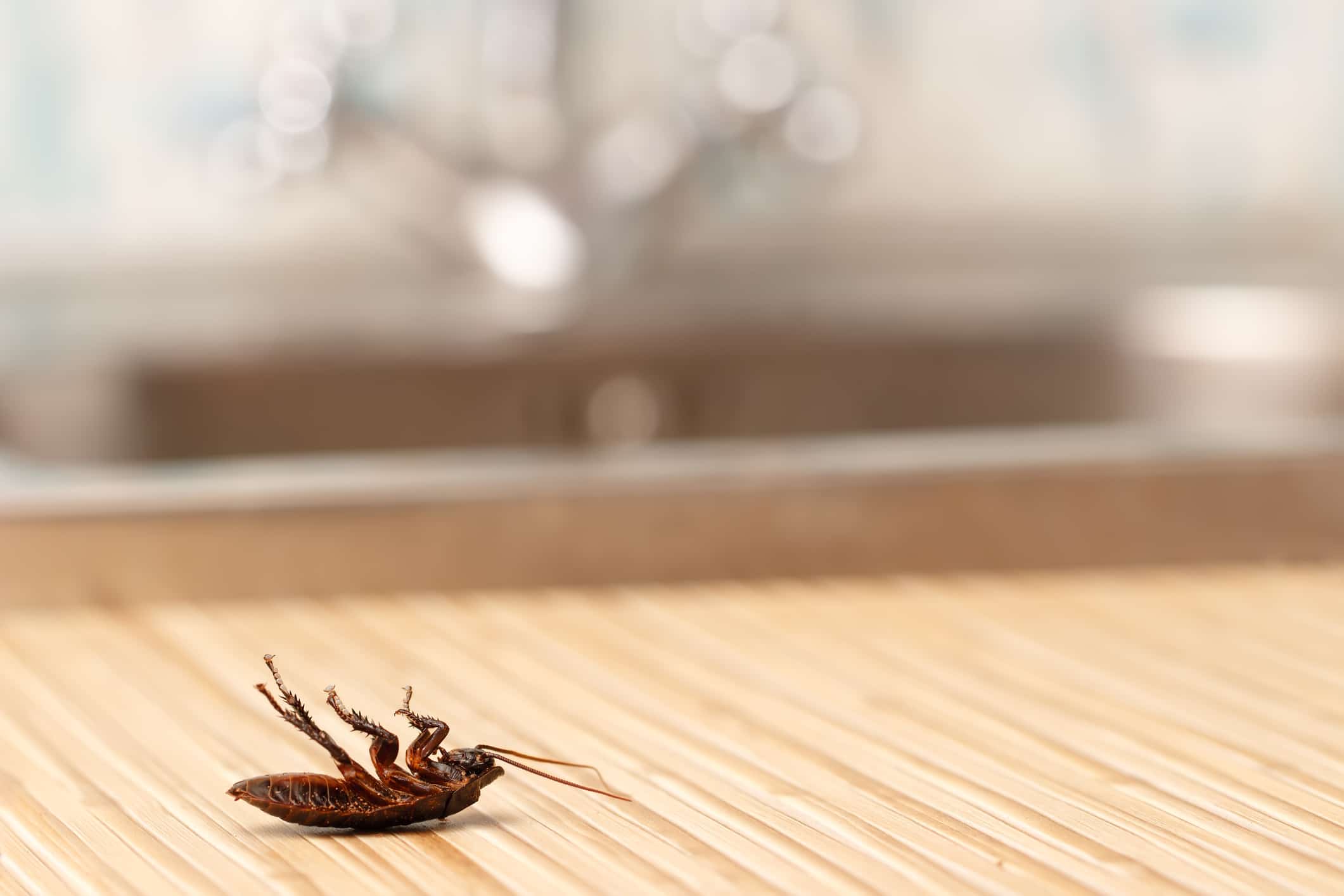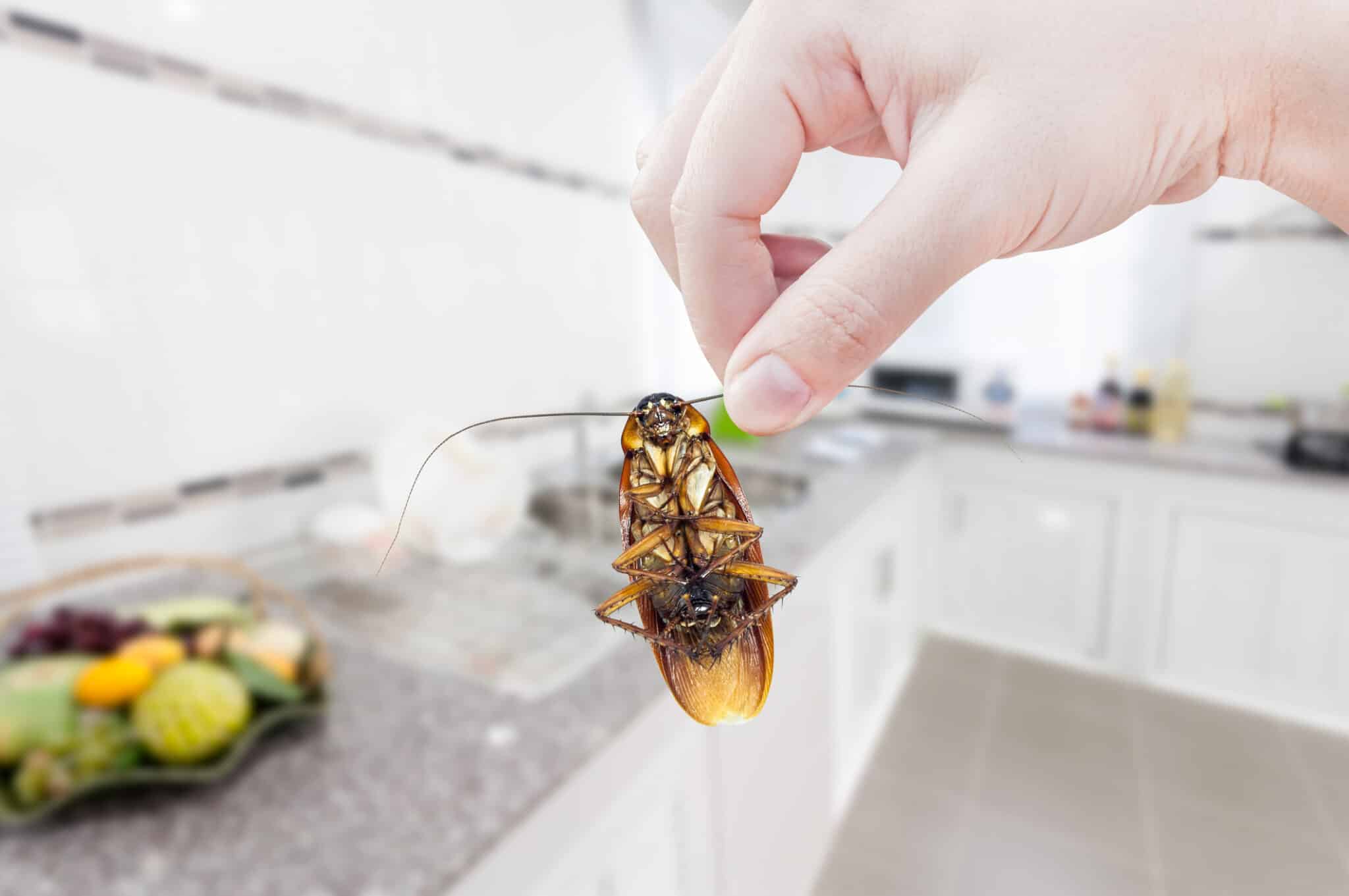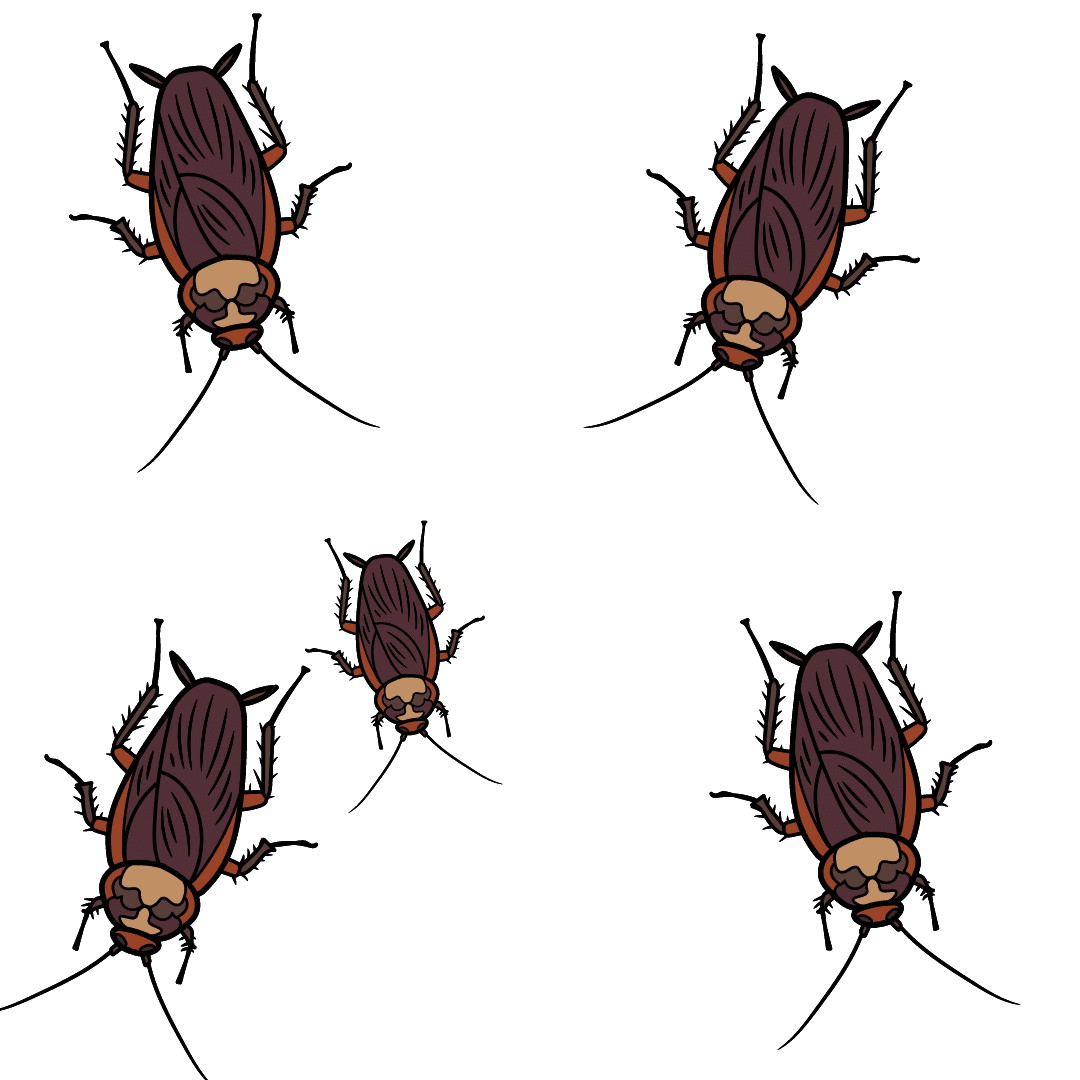Can I Sue My Landlord For Roaches In My Apartment?
Is your landlord failing to deal with cockroaches in your apartment? You may be entitled to compensation.
Roach APARTMENT Infestation LAWYERS

At first you see one or two cockroaches scuttle across your kitchen counter. Within days, turning the light on in the middle of the night reveals their increasing numbers.
Once you see a couple of cockroaches, they soon takeover. A female produces hundreds of offspring a year, and they survive in the most adverse conditions. Beyond their cringe factor, their unsightly presence makes your home an unhygienic place to live. Extra cleanliness does little to impact their growing swarm. Spot treating with sprays and traps does not address the issue because they hide in a variety of unseen spaces.
TELL US ABOUT YOUR PROBLEMS
Roaches in Apartment Law Firm
Start the ball rolling by making an official complaint to your landlord. He or she may try to shrug off the issue or try to blame you or other tenants for the problem. However, an infestation of cockroaches is not an issue to be ignored and legally they are bound to address the issue properly.
In most cases, California law dictates that bug and pest infestations render apartments uninhabitable. If you are having serious issues with cockroaches, your landlord has a duty to remedy the situation.

Landlord Tenant Disputes
Property TORTs
Personal Injuries and Premises Liability
Habitability Cases
testimonials
TELL US ABOUT YOUR PROBLEMS

THE DANGERS OF ROACHES IN YOUR APARTMENT ARE REAL
Cockroaches carry and spread a wide array of diseases, bacteria, and germs. Their droppings and saliva can cause E. coli, salmonella, typhoid, urinary tract infections, digestive problems, and sepsis. People with compromised immune systems are especially in danger.
When cockroaches are eating, they defecate on their food source and any other surface that they come across. Their feces contain bacteria, dead skin, and empty eggshells. If you eat food contaminated by a cockroach, you can suffer from severe food poisoning.
Cockroaches can both cause and aggravate respiratory issues. The saliva that cockroaches continually secrete contains hundreds of allergens that can cause rashes, sneezing, and itchy, watery eyes. Cockroach infestations can also worsen existing allergy symptoms and asthmatic issues.
You have the right to a sanitary living space if you’re paying rent. Professional extermination is the only way to address the problem.
NO UPFRONT COSTS
Our experienced tenant lawyers in California are committed to helping tenants claim their rights that have been neglected for too long. With decades of experience, we have recovered millions from landlords who fail to provide safe properties as required by law. We aim to empower tenants with knowledge and determination to fight for justice.
THE IMPLIED WARRANTY OF HABITABILITY
Under California law, the implied warranty of habitability is a promise given to keep your rental unit habitable. The landlord must maintain the premises in a safe, working, livable condition, which means fixing issues as needed.
This warranty is not a part of your lease and exists no matter what your oral and written lease says. If the landlord breaches this promise and your apartment becomes unlivable, you may have the right to fix a problem yourself and deduct the cost from rent, move out without a financial detriment, or sue the landlord for compensation.


GIVE YOUR LANDLORD WRITTEN NOTICE OF THE COCKROACHES
The first step is to notify your landlord immediately of the infestation. Report the cockroach issue in writing as well as by talking with your landlord. Retain a copy of the letter or emails for your own records. This secures proof that your landlord was aware of the issue and refused to address it.
Obtain proof of your cockroach problem: photos, videos, a report from a pest control professional. Once you have notified your landlord, allow for reasonable time for repairs/pest eradication.
UNDERSTANDING ROACH INFESTATIONS
A roach infestation is not just a nuisance but can pose serious health risks, including the spread of various diseases and triggering allergies. Understanding the signs of an infestation and the conditions that lead to one can help you take preventive measures or address the issue in its early stages.
WHAT CONSTITUTES A ROACH INFESTATION?
A roach infestation refers to the presence of a significant population of roaches within a residential. It’s not just about spotting a single roach; rather, it involves a sustainable breeding population that continually multiplies and expands. These pests are typically attracted to food sources, warmth, and moisture, all common in human habitation. Moreover, roaches are known for their rapid reproduction, meaning even a small unnoticed population can explode into a full blown infestation in a matter of weeks.
SIGNS TO LOOK OUT FOR
Recognizing the signs of a roach infestation early on can make the difference between a manageable problem and a major issue. Here are the telltale signs:
- Sightings: Roaches are nocturnal creatures, so seeing them during the day can indicate a large population competing for resources
- Droppings: Similar to coffee grounds or black pepper, roach droppings are a clear sign of infestation
- Odor: Roaches emit a musty, unpleasant odor that becomes more pungent as the infestation grow
- Egg Cases: Finding roach egg cases (oothecae), which are oblong, brownish protective shells, often signals a growing population
- Damage: Roaches may damage paper products, books, and sometimes even leather and clothing
LANDLORD RESPONSIBILITIES IN HANDLING ROACH INFESTATIONS
As a tenant, dealing with roach infestations can be a stressful experience. Understanding your landlord’s responsibilities can help protect your rights and guide you on the steps to take in such a situation.
HOW LONG DO LANDLORDS HAVE TO ADDRESS THE ISSUE?
Landlords are legally obligated to provide habitable housing, which includes addressing pest infestations. The timeframe for addressing the issue may vary based on local and state laws, but typically, a landlord should start the process within 24 to 48 hours of being notified. Depending on the severity of the infestation, the extermination process may take days to weeks. It’s recommended for tenants to check their local regulations for specific timeframes.
WHAT TO DO IF THE LANDLORD REFUSES TO ADDRESS THE ISSUE
If a landlord is unresponsive or refuses to address a reported roach infestation, tenants have several courses of action:
- Report the Issue: Contact your local health department or housing authority. They can assess the situation and potentially enforce corrective measures
- Repair and Deduct: Some jurisdictions allow tenants to pay for pest control services themselves and deduct the cost from their rent
- Legal Action: If the infestation persists, tenants can consider legal action for breach of the implied warranty of habitability
How to Prove the Landlord was/is Aware of the Infestation
It’s crucial to have evidence that your landlord was notified about the infestation. Here’s how you can document it:
- Written Communication: Always report the infestation in writing (email or letter), and retain a copy of the correspondence for your records
- Photos and Videos: Visual evidence of the roaches, their droppings, or any damages can be compelling proof
- ThirdParty Statements: Statements from neighbors, exterminators, or health inspectors who have witnessed the infestation can also serve as evidence
- Certified Mail: If you send the notification through certified mail, the receipt can prove the landlord received your notice
By understanding these aspects of a landlord’s responsibilities towards roach infestations, tenants can ensure they’re equipped to protect their rights and live in a healthy, safe environment. If the issue is not resolved, consulting with a lawyer experienced in tenant’s rights and landlord disputes can help navigate through the process effectively.
NO UPFRONT COSTS
Our experienced tenant lawyers in California are committed to helping tenants claim their rights that have been neglected for too long. With decades of experience, we have recovered millions from landlords who fail to provide safe properties as required by law. We aim to empower tenants with knowledge and determination to fight for justice.
FAQ’s
Are landlords responsible for roaches in California?
In California, landlords have the responsibility to provide habitable living conditions for their tenants, which includes keeping the rental property free from infestations of pests such as roaches. Landlords are required to maintain the rental property in a condition that meets basic health and safety standards, and they must take action to address pest infestations when they become aware of them.
Under California law, tenants have the right to a habitable dwelling, and landlords are required to maintain the premises in a condition that is fit for human occupation. If a tenant reports a pest infestation, such as a roach problem, the landlord is generally responsible for taking prompt action to eliminate the infestation.
If a landlord fails to address a pest infestation in a timely manner, the tenant may have legal remedies available, such as withholding rent, terminating the lease, or suing for damages. However, it is important for tenants to follow proper procedures and document their complaints and communications with the landlord in order to protect their rights.
Contact us for a complimentary consultation to determine whether you may have a viable case.
Can I break my lease because of roaches in California?
Under California law, landlords are required to provide tenants with habitable living conditions, which includes freedom from vermin and pests such as cockroaches. If your landlord has failed to provide you with a habitable living space, you may be able to break your lease.
However, before breaking your lease, you should first notify your landlord in writing of the cockroach infestation and give them a reasonable amount of time to address the issue. If your landlord fails to take action within a reasonable timeframe, you may have a valid reason to terminate your lease.
It’s important to note that breaking a lease can have legal and financial consequences, so you should consult with an attorney or a tenant advocacy group before taking any action. They can provide you with specific guidance on your rights and options as a tenant in California.
Contact us for a complimentary consultation to determine whether you may have a viable case.
Can I sue my landlord for roaches in California?
Under California law, tenants have the right to live in a habitable dwelling that is free from vermin and pests, including cockroaches. If your landlord has failed to provide you with habitable living conditions, you may have the right to sue your landlord for damages.
To pursue legal action, you should first document the extent of the cockroach infestation and notify your landlord in writing of the problem. Give your landlord a reasonable amount of time to address the issue, but if they fail to take action, you may want to consider filing a lawsuit.
Before filing a lawsuit, it’s a good idea to consult with an attorney who is knowledgeable about tenant-landlord law in California. They can help you determine the strength of your case and guide you through the legal process.
If you decide to sue your landlord, you may be able to recover damages for any harm caused by the cockroach infestation, such as property damage or medical bills. You may also be able to recover damages for any expenses you incurred, such as the cost of hiring an exterminator or staying in a hotel while your apartment is being treated.
Keep in mind that pursuing legal action can be time-consuming and expensive, so it’s important to weigh the potential benefits and costs before deciding to sue your landlord.
Contact us for a complimentary consultation to determine whether you may have a viable case.
Do roaches make an apartment uninhabitable?
Roaches can make an apartment uninhabitable if the infestation is severe enough. In California, landlords are required by law to provide tenants with habitable living conditions, which includes freedom from vermin and pests such as cockroaches.
If there is a significant cockroach infestation in your apartment, it can affect your health and well-being in a number of ways. Cockroaches can trigger allergies and asthma, contaminate food, and spread diseases. In addition, the sight of cockroaches crawling around can be unsettling and cause psychological distress.
In cases where the cockroach infestation is so severe that it poses a health hazard or interferes with the tenant’s enjoyment of the apartment, the apartment may be considered uninhabitable. This can give the tenant the right to break the lease or pursue legal action against the landlord.
However, if the infestation is minor and the landlord takes reasonable steps to address the problem, the apartment may still be considered habitable. The key is to notify your landlord of the issue and give them a reasonable amount of time to take action to address the problem.
Contact us for a complimentary consultation to determine whether you may have a viable case.
What to do if my apartment is infested with cockroaches?
If your apartment is infested with cockroaches, here are some steps you can take:
- Notify your landlord or property manager: Contact your landlord or property manager immediately and inform them of the cockroach infestation. Ask them to take action to address the problem as soon as possible.
- Clean and sanitize your apartment: Cockroaches are attracted to food and moisture, so make sure to keep your apartment clean and free of crumbs or spills. Dispose of garbage regularly and wipe down surfaces with a disinfectant.
- Seal any cracks or gaps: Cockroaches can enter your apartment through tiny cracks and gaps. Seal any openings around pipes, windows, and doors with caulk or weatherstripping.
- Use baits and traps: Cockroach baits and traps can be effective in reducing the population of cockroaches in your apartment. Follow the instructions carefully and place them in areas where cockroaches are likely to be.
- Hire a professional exterminator: If the infestation is severe, you may need to hire a professional exterminator. Make sure to choose a licensed and experienced pest control company that uses safe and effective methods.
- Keep records: Keep a record of all your communications with your landlord or property manager about the cockroach infestation, including the date and time of each conversation or email.
Remember that under California law, landlords are required to provide tenants with habitable living conditions, which includes freedom from vermin and pests such as cockroaches. If your landlord fails to take action to address the infestation, you may have legal options such as breaking your lease or suing your landlord.
Contact us for a complimentary consultation to determine whether you may have a viable case.
How can I effectively document a roach infestation in my apartment?
Contact us for a complimentary consultation to determine whether you may have a viable case.
Is it possible to deduct exterminator costs from my rent if my landlord doesn't address the roach infestation?
Contact us for a complimentary consultation to determine whether you may have a viable case.
What are the key signs of a severe roach infestation to be cautious about?
Contact us for a complimentary consultation to determine whether you may have a viable case.
Can I request a rent reduction or compensation due to a roach infestation?
Contact us for a complimentary consultation to determine whether you may have a viable case.
What are my rights if my children or pets become ill due to a roach infestation?
Contact us for a complimentary consultation to determine whether you may have a viable case.
Can I pursue legal action if a roach infestation has damaged my personal belongings?
Contact us for a complimentary consultation to determine whether you may have a viable case.
ADDITIONAL INFORMATION
Under California law, your landlord has about 30 days to deal with an insect infestation. If you have not heard back from your landlord or had an exterminator visit your apartment within 30 days, it is time to take the necessary precautions to secure your apartment as a safe living space.
If the cockroach issue is not handled within 30 days of an official complaint, here are some of your options:
- Take the matter into your own hands. You can hire a professional exterminator to handle the problem. Make sure that the cost of treatment isn’t more than one month’s rent. Save the receipt and deduct the cost from your rent.
You should contact an experienced tenant rights attorney to assess your best possible options and to create a plan of action. If you “repair and deduct” incorrectly, you could be out a lot of money.
- If the landlord refuses to address the infestation, you may move out of the apartment and break your lease. You can also abandon your lease if your living conditions are unsanitary and a compromise to your health.
With legal consultation and representation, you can end your lease through the right channels and get your security deposit back without fear of paying for the rest of your rental contract.
To learn more about your rights regarding cockroach infestations, contact a professional attorney from Brinton Law Firm. Our lawyers can guide you through this unpleasant situation to secure hospitable living conditions.
CONTACT US NOW

